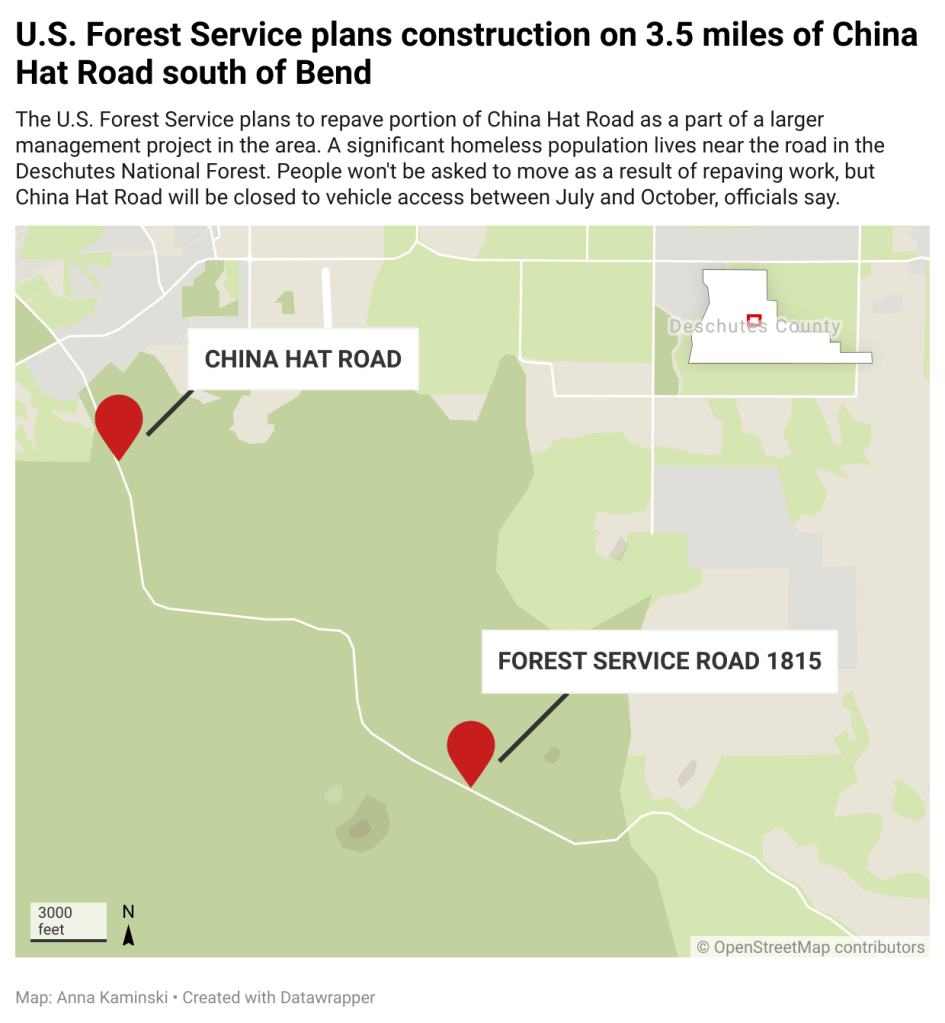Forest Service work won’t force out campers near China Hat Road…yet
Published 5:45 am Sunday, March 3, 2024

- USFS construction map, China Hat Road
Plans to repave part of China Hat Road just south of Bend this summer won’t force homeless people living nearby on Deschutes National Forest land to move, a Forest Service official said.
However, the repaving is just the first inkling of what’s to come. It’s part of a nearly 26,000-acre, multi-year project that will eventually lead to thinning, brush clearing and prescribed burns in the areas where campers are staying long-term.
Trending
The Forest Service’s plans put a ticking time clock on local officials to take action.
“Houselessness in our national forests is not an isolated problem but part of a broader societal issue that spans across city, county, state and federal jurisdictions,” a recent release from the Forest Service said.
The Forest Service doesn’t have the authority to remove, or trespass, people from forestland, unlike other jurisdictions. Instead, Forest Service law enforcement officers can write citations for sanitation and for exceeding the 14-day limit on camping, but that’s as far as their authority extends.
“When those citations are written, a federal magistrate would need to give authorization to trespass somebody,” said Kaitlyn Webb, the public affairs officer for the Deschutes National Forest.
The Forest Service last attempted to move people from Deschutes National Forest land en masse in 2022, after facing pressure from neighboring private property owners. But the effort was ineffective.
That pressure has persisted. Many people living near China Hat Road testified before the Deschutes County Commissioners last year advocating for action.
Trending
The Bulletin’s dedicated homelessness coverage
What’s going on near China Hat Road?
Conflicts on forest trails in the China Hat Road area date back to the early aughts. In addition to its status as a bastion of recreation, forestland near the road has been used as an unofficial landfill and shooting range for residents for longer, according to The Bulletin’s archive.
Homelessness, however, has been slightly more recent with documented reports dating back to 2018.
Public land — not just forestland, but county, state and other federal land, too — has become a place people can go without being subject to camping codes and frequent efforts to clear them from an area.
It’s unfair to solely blame the Forest Service for homelessness, said Deschutes County Commissioner Phil Chang. Their hands are tied in a lot of ways, he said.
“We have all produced this,” he said.
Frank Strupith is the homeless outreach coordinator for Central Oregon Veterans Outreach, a Bend nonprofit specializing in outreach to homeless and at-risk veterans and individuals. He visits people living near China Hat Road weekly, bringing lunches and basic hygiene products, connecting people to case management services and cleaning up trash.
Strupith often hears, “It’s an eyesore.” “And that’s probably being nice about it,” he said.
It’s easy to describe the ugliness without looking any deeper, Strupith said.
“But being able to take a moment and stop,” he said. “What caused a person to want to live in what people would consider filthy conditions?”
An estimated 1,076 people are unsheltered in Deschutes County on a given night, according to the annual Point in Time Count from January 2023. The Forest Service declined to provide estimates of how many people are living in the China Hat Road area.
Commissioner Tony DeBone said China Hat Road has a reputation that stretches beyond Central Oregon. He said he has met some people who have come from around the country to the China Hat Road area.
“They’re coming here without any connections,” he said.
However, Strupith said he’s learned in his two months doing outreach that people are there for a variety of reasons and from a variety of places. Housing unaffordability and unavailability are often cited. The Point in Time Count says that an estimated 80% of people who are homeless in Central Oregon became homeless while living there.
Local and state elected officials have gone beyond finger pointing and reached a consensus that something ought to be done. The Coordinated Houseless Response Office, a legislatively empowered office that seeks to address homelessness in Deschutes County, is currently soliciting proposals for a managed camp.
The Cabin Butte Vegetation Management project
The work on China Hat Road, which is slated to take place from June through October, will cut off vehicle access from the Deschutes National Forest boundary to Forest Service Road 1815. It’s a vital thoroughfare for timber operations, resource management, recreation access and fire response.
“The road itself has deteriorated quite a bit. It’s not in good condition,” said Webb, the Deschutes National Forest Service spokesperson.
Crews will be repaving just over three miles of road, which means traffic both ways will be completely prohibited, save for emergency access.
Webb said the Forest Service has begun notifying homelessness service providers of the construction, and they will begin to notify campers in the next month or so.
The repaving and future prescribed burns in the area are a part of the Forest Service’s Cabin Butte vegetation management project. Work began in 2023 and is expected continue for the next several years. Tree thinning and brush clearing in the area where people live will not begin until 2025 and 2026, Webb said. Prescribed burns are expected to take place across the entire project area for the following several years, she said.
More information about the Cabin Butte vegetation management project can be found at bit.ly/CabinButteStoryMap.








